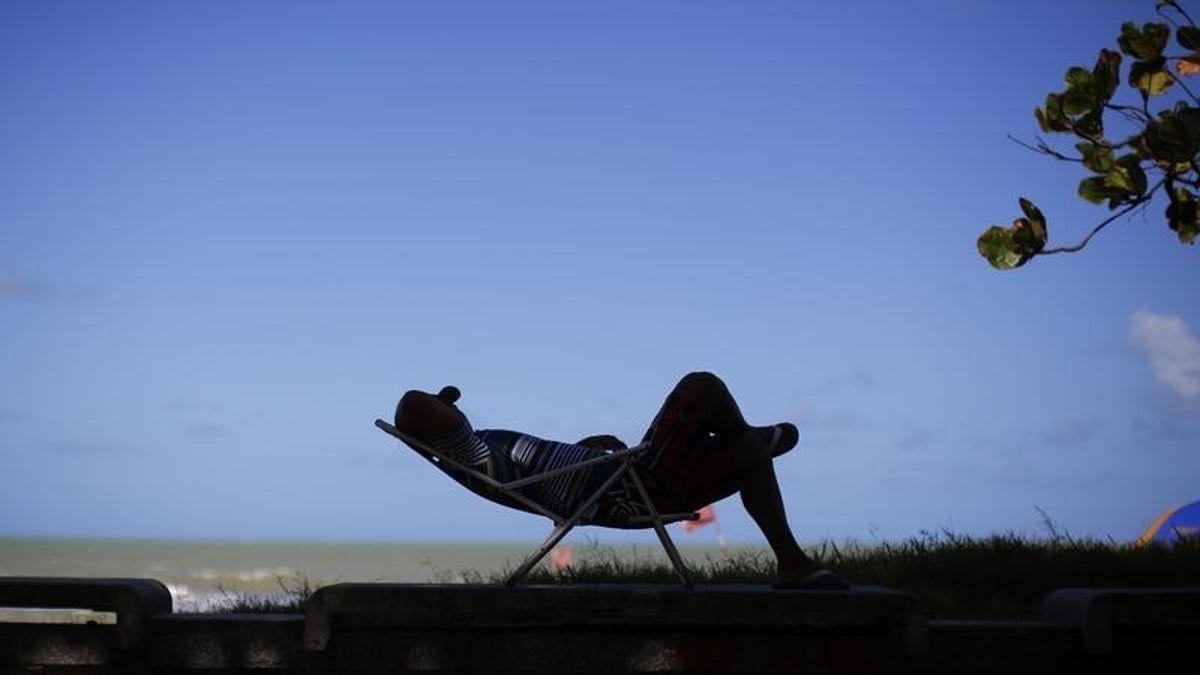
A shop worker rests in the shade along the beach in Recife (Copyright Reuters 2016)
Getting too little sleep may activate the same chemical pathways in the brain that are involved in heightened attraction to and enjoyment of junk food associated with marijuana use - also known as "the munchies" - according to a small U.S. study.
Researchers found that a night of restricted sleep was followed by extended peaks, later in the day, in natural signaling chemicals that regulate hunger and pleasure. They think that may be one reason sleep deprivation is linked to weight gain.
"Our current study adds to that growing literature and suggests that along with changes in leptin and ghrelin, alterations in endocannabinoids - all changing in the direction to favor food intake - may be mechanisms by which sleep restriction promotes overeating," said lead author Erin Hanlon, a research associate in endocrinology, diabetes and metabolism at the University of Chicago.
"And, on a larger scale, evidence from both laboratory and epidemiologic studies have consistently associated insufficient sleep or short sleep with increased risk of obesity," Hanlon said.
The researchers studied 14 healthy young adults ranging in age from 18 to 30 years who got four nights of sufficient sleep, about eight and a half hours, then four nights of sleep restricted to 4.5 hours. The two sleep tests took place in a sleep lab and were separated by a month.
During waking hours, participants were housed in a private room and kept basically sedentary. They had three identical meals at 9 a.m., 2 p.m. and 7 p.m.
In each test, calorie intake was controlled for the first three days and on the fourth day participants were allowed to eat as much or as little as they liked from a buffet tailored to individual preferences. Meanwhile, researchers monitored participants' calorie intake and analyzed blood samples.
Participants also answered questions about their hunger, appetite, energy level and mood during the 24-hour period of blood sampling, 25 minutes before each meal and one hour and 35 minutes afterward.
When sleep deprived, participants had higher levels of endocannabinoid 2-arachidonoylglycerol (2-AG), a chemical signal that makes foods, particularly junk foods, pleasurable. This blood chemical is usually low overnight and rises steadily during the day, peaking in the afternoon.
But in the sleep-deprived phase, 2-AG remained elevated late in the evening and participants reported higher hunger scores, according to the results in the journal Sleep.
"These are the first results showing that sleep restriction influences the endocannabinoid system in humans," said Frank Scheer of the Medical Chronobiology Program at Brigham and Women's Hospital in Boston who wrote a commentary alongside the new study. "This opens up a new insight into systems involved in energy balance and food reward," he told Reuters Health by email.
"Previous studies had shown that experimental sleep loss causes an increase in 'hunger hormone' ghrelin and a decrease in 'satiety hormone' leptin," Scheer said. "The increase in the peak in endocannabinoids following sleep restriction provides an additional mechanism that could help explain an increase in hunger."
Adults should aim for seven to nine hours of sleep per night, he said.
"With decreasing amounts of sleep, the metabolic effects appear to become progressively stronger," Scheer said.
SOURCE: http://bit.ly/1UzIW0G and http://bit.ly/1VRhaLB Sleep, online February 29, 2016.
